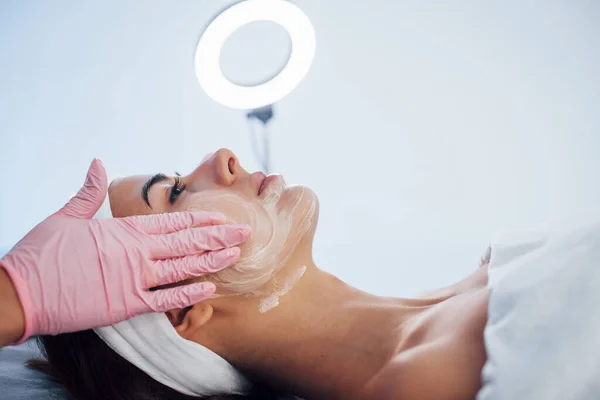How To Choose The Right Skin Treatment For Your Skin Type
Choosing the right skin treatment can be a daunting task, especially with the plethora of options available in the market. Your skin type is a crucial factor to consider when selecting skincare products or treatments. Understanding your skin type and its specific needs will help you choose treatments that will enhance your skin’s health and appearance.
Understanding Your Skin Type
Normal Skin
Normal skin is well-balanced, with no excessive dryness or oiliness. It has a smooth texture, fine pores, and a healthy glow. People with normal skin can tolerate most skincare products but still need to maintain a regular skincare routine to keep their skin healthy.
Oily Skin
Oily skin is characterized by an overproduction of sebum, making the skin look shiny and greasy, especially in the T-zone (forehead, nose, and chin). This skin type is prone to acne, blackheads, and enlarged pores. Choosing non-comedogenic and oil-free products is essential to manage oily skin effectively.
Dry Skin
Dry skin lacks moisture and can feel tight, rough, and flaky. This skin type is prone to irritation, redness, and fine lines. Hydration is key for dry skin, so using moisturizing and hydrating products is crucial to maintaining skin health.
Combination Skin
Combination skin has characteristics of both oily and dry skin. Typically, the T-zone is oily, while the cheeks are dry or normal. Balancing the skincare routine to address both oily and dry areas is important for this skin type.

Sensitive Skin
Sensitive skin is easily irritated and can react to various environmental factors and skincare products. It may exhibit redness, itching, and dryness. Using gentle, hypoallergenic, and fragrance-free products is vital for sensitive skin.
Identifying the Right Treatment for Each Skin Type
Treatments for Normal Skin
For normal skin, maintaining balance is key. Regular cleansing, toning, and moisturizing are sufficient to keep the skin healthy. Exfoliating once a week and using a hydrating mask can enhance the skin’s natural glow. Using products with antioxidants like vitamin C can help protect the skin from environmental damage.
Treatments for Oily Skin
For oily skin, controlling excess oil production is the primary goal. Cleansers with salicylic acid or benzoyl peroxide can help reduce oil and prevent acne. Oil-free and non-comedogenic moisturizers are essential to avoid clogging pores. Clay masks can absorb excess oil and purify the skin, while exfoliating twice a week can prevent buildup of dead skin cells.
Treatments for Dry Skin
For dry skin, hydration is paramount. Using a gentle, hydrating cleanser followed by a rich moisturizer can help retain moisture. Products containing hyaluronic acid, glycerin, and ceramides are beneficial for dry skin. Applying a hydrating serum and using a humidifier can also aid in maintaining skin moisture. Avoiding harsh exfoliants and opting for gentle, hydrating masks is crucial.
Treatments for Combination Skin
For combination skin, a balanced approach is necessary. Using a gentle cleanser that doesn’t strip the skin of natural oils is important. Lightweight, oil-free moisturizers can be applied to the T-zone, while richer creams can be used on dry areas. Exfoliating once a week and using targeted treatments, such as clay masks for the T-zone and hydrating masks for dry areas, can help balance the skin.
Treatments for Sensitive Skin
For sensitive skin, simplicity is key. Using hypoallergenic and fragrance-free products minimizes the risk of irritation. A gentle, hydrating cleanser and a soothing moisturizer with ingredients like aloe vera and chamomile can calm the skin. Avoiding harsh exfoliants and opting for gentle, soothing masks can prevent irritation. Patch testing new products before full application is advisable to avoid adverse reactions.

Additional Tips for All Skin Types
Sun Protection
Regardless of skin type, protecting the skin from the sun is crucial. Using a broad-spectrum sunscreen with at least SPF 30 every day can prevent premature aging, sunburn, and skin cancer. Reapplying sunscreen every two hours when outdoors is essential for continuous protection.
Hydration and Diet
Staying hydrated by drinking plenty of water and maintaining a balanced diet rich in fruits, vegetables, and healthy fats can improve skin health. Avoiding excessive consumption of sugar and processed foods can reduce the risk of skin issues like acne and inflammation.
Consistent Routine
Consistency is key to achieving and maintaining healthy skin. Sticking to a regular skincare routine tailored to your skin type ensures long-term benefits. Avoiding frequent changes in skincare products can prevent irritation and allow the skin to adapt and respond positively to the treatments.
Consulting a Dermatologist
If you're unsure about your skin type or the best treatments for your skin, consulting a dermatologist is highly recommended. A dermatologist can provide a professional assessment of your skin and recommend suitable treatments and products tailored to your specific needs. They can also help address any persistent skin issues and offer guidance on maintaining healthy skin.
Advanced Skincare Treatments
In addition to natural remedies and a healthy diet, there are advanced skincare treatments that can address specific skin concerns effectively.
- Chemical Peels: Chemical peels involve applying a chemical solution to the skin, causing the top layer to peel off. This treatment can improve the appearance of fine lines, acne scars, and uneven skin tone.
- Microneedling: Microneedling uses fine needles to create micro-injuries in the skin, stimulating collagen and elastin production. This treatment can improve skin texture, reduce the appearance of scars, and enhance the absorption of skincare products.
- Laser Therapy: Laser therapy can target various skin issues, including pigmentation, redness, and fine lines. Different types of lasers are used for different skin concerns. For instance, fractional lasers can improve skin texture and tone, while vascular lasers can reduce redness and broken capillaries.
Backfocus 7/520 Collins St, Melbourne VIC 3000, Australia
Phone: 1800 248 975

